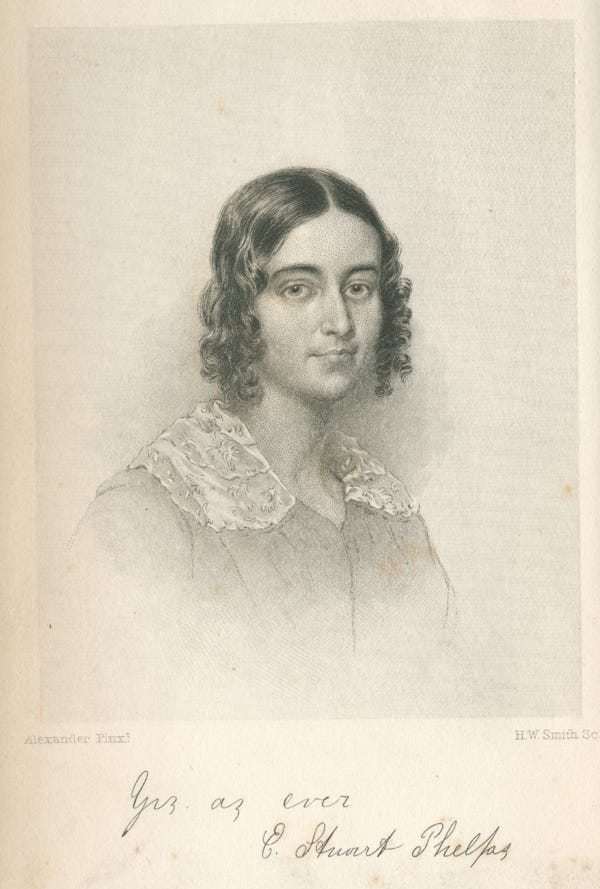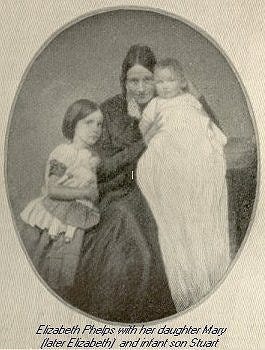Hello and welcome if you’re new to History Buzz! If you enjoy this story, please share History Buzz with fellow history buffs, like, and comment. To have History Buzz stories sent directly to your inbox, you can subscribe to the newsletter—for free or for a few dollars per month. You can also donate to the History Center. Your paid subscription helps make the research and writing behind History Buzz possible. Thanks for reading!
The Andover Advertiser and rural newspapers, part 5
And so we end our series on the first issue of the Andover Advertiser with the first page, which is where most readers would have begun. The front page in the 1850s, however, was not what we expect given that the news industry today leads with the most important and news-worthy stories.
One key feature of small-town newspapers was fiction, often culled from other papers through exchanges with big city newspapers. Occasionally editors ran works of fiction and poetry written by local readers.1 In this post, I share the work of fiction by Elizabeth Stuart Phelps that filled the entire front page of the first two issues of the Advertiser.
For his first issue, Warren Draper ran a story written by local author Elizabeth Stuart Phelps. Phelps had died the previous year at the young age of 38. In the paper, he referred to her as “our dear, lamented friend, Mrs. Professor Phelps, of Andover.”
The name Elizabeth Stuart Phelps might be familiar to those who know 19th century American literature. However, just to confuse things a little, the name belongs to two authors: mother and daughter. The Elizabeth Stuart Phelps, whose story was published by Warren Draper, was the senior Elizabeth Stuart Phelps whom I’ll refer to as Mrs. Phelps to distinguish her from her more widely-known daughter.
Mrs. Phelps’ daughter, christened Mary, was only 8-years-old when her mother died. Her impact was so powerful, however, that daughter Mary adopted her mother’s name while she was still in school.
Daughter Elizabeth Stuart Phelps would go on to become one of the country’s best-selling authors. Her book, The Gates Ajar, helped heal a nation deeply wounded from years of devastating Civil War.
Both mother and daughter were daughters of Andover Theological Seminary faculty members. Both attended Abbot Academy, which has been described by some as having been founded to train the future wives of Seminary graduates, “to be apt critics of their husbands’ sermons.”2
“In their attention to women’s needs and rights the Phelpses were reacting against the ‘feudal view of women’3 typical of their community, Andover, Mass.”4
Mother and daughter were early feminists - clearly writing from their 19th century perspective - who wrote about the everyday lives of women. In her writing, Mrs. Phelps, offered realistic depictions of the injustices that women suffered from being limited to the domestic environment.5
Mrs. Phelps herself, suffered intermittent illness from the age of sixteen when she completed formal schooling. Her daughter attributed this onset of illness at the end of school to the resulting cessation of stimulation.6
While illustrating the drudgery of a purely domestic life, in her stories Mrs. Phelps also described what women could do to rise above their situation when given the opportunity.
During her short writing and publishing career, from 1851 to 1853, Mrs. Phelps published under the pseudonym “H. Trusta.”7 Her published works were,
The Sunny Side; or the Country Minister’s Wife (selling 40,000 copies its 2nd year)
A Peep at Number Five; or a Chapter from the Life of a City Pastor
Angel Over the Right Shoulder
The Tell-Tale: Or, Home Secrets Told by Old Travellers [sic] (a collection of stories)
The story on the front page of the paper’s first issue was from The Tell Tale, a collection of stories published posthumously, the year after the author’s death.
“What Sent One Husband to California – A Tale Over True”
Juliette Warren was once a vivacious young woman, but by the time of the story, with a husband and four children, she had become “a feeble woman” much changed by her illnesses.
When the story opens, Juliette’s husband Harry Warren ran into an old friend, Charley Morton, while on his way home from work. Knowing what awaited him at home, Harry nervously invited Charley in for a meal.
Seating his friend in the dusty, neglected parlor, Harry rushed to the kitchen to ask the family’s long-time servant, Betty, to prepare the meal. He then went upstairs to see his wife.
The room was partially darkened; and on the bed in a loose sick-gown, with disheveled hair, lay Mrs. Warren. Her hand rested on a bottle of camphor…
“Juliette, my love, are you ill?’
Suffering from a headache, Juliette chastised Harry for bringing company home. Harry did not press the matter, and returned to the parlor to his friend. What a misfortune it is for a young man to have an ailing wife! My servants rule, my children are neglected, my house is in disorder...I am weary of it!
Harry and Charley enjoyed each other’s company, sharing stories about their days together in other times. Much to Harry’s relief, the dinner bell rang. But dismay quickly followed when in trooped his four children, ill-dressed and noisy. To Harry’s embarrassment there were no clean napkins for the table, no shining spoons, no order.
Halfway through dinner, Juliette languidly entered into the room, still wearing her sick-gown, with uncombed hair, complaining about her life and ill health. The previously social atmosphere of the dinner faded away. Harry’s friend Charley left feeling pity for his friend.
The situation continued for several more years, with Harry living with a wife who, seemed to have made up her mind that she must suffer.
Trying to keep business, family, and home together, Harry’s business began to suffer and he fell into debt. He couldn’t share his troubles with his wife, so he formed his plans without her.
One October morning, Juliette arose late and discovered that her husband was gone.
The next day, a letter from Harry arrived.
So ended part one in the first issue with “Conclusion next week,” but I won’t make you wait. By the end of part 1, The Tell Tale reads as an indictment against the author herself, as she, too, suffered greatly from headaches and other ailments. However, in the more redemptive part 2 of the story, Mrs. Phelps painted a picture of what she herself could have done, and become, if released from the narrowness of a purely domestic life.
“What sent one husband to California, concluded”
In his letter, Harry described how, because his business had been failing for years, he had fallen deeper into debt. As he fell into despair, a friend suggested that he go to California to seek opportunity there in the goldfields. Harry sold his business to the friend, paid his debts and the house rent for two years in advance. He enclosed the $50 that remained in his letter to Juliette.
Harry closed his letter declaring his love for his wife and children, writing that he was seeking opportunity for them so they would not have to live in poverty.
Juliette responded to Harry’s letter and abandonment with anger, self-pity, and malaise, dividing her time between her bed and the sofa. Until one day, Betty came to her for household money and Juliette found they were down to their last few dollars.
Now was the time for Juliette to rise to the occasion.
But how had Juliette come to be in such a low state in the first place? The seeds of her future misery...had been carefully sown by her over-indulgent mother. Juliette was brought up to feel that everything must yield to her poor feelings.
She had no resolution to change her life - until now. Against all odds, she decided to take in boarders.
With new-found strength, purpose, and work, Juliette discovered that she could rule her disordered nerves...She found out there was no doctor for her like Dr. ‘Have-to.’
With her strength, spirit, and purpose restored, Juliette’s boarding house became a great success. She saw the errors of her old ways and wondered what reasons she had ever given her husband to come home again. Juliette determined to save as much of her earnings as she could so she could help Harry set up a business when - and if - he did return.
One morning, while she was at the breakfast table presiding over a house full of boarders and looking the picture of health, Charley Morton walked into the dining room. He was accompanied by a stranger with an immense mustache and whiskers.
It was Harry, much changed himself, returned to find his wife a changed woman.
After sharing with her husband her Tell Tale, she presented Harry with the treasure she had so carefully saved. He then presented Juliette with the results of his California gold hunting. They had enough, we presume to have set Mr. Warren up in the very handsome store where last we saw him.
Mrs. Phelps closed with, Should there be any wives who have not yet been able to find out what sent their husbands to California, Juliette’s history may give them a little insight into the matter.
Rather than an indictment against weak women who gave into real or imagined ailments, the Tell Tale is instead about the strength women have within themselves to rise to the challenges of life when their lives were allowed to expand beyond the close confines of domestic affairs.
Pretty daring for 19th-century “feudal” Andover, Massachusetts.
Thanks so much for reading! This concludes the series on the first issue of the Andover Advertiser. I hope you enjoyed it. I appreciate your feedback and responses to our first reader survey, and look forward to your comments and conversations. Your comments on the History Buzz website help build the success of the newsletter.
Cheers!
Elaine
American country newspapers 1800-1860
https://www.library.illinois.edu/hpnl/tutorials/antebellum-newspapers-country/
Carol Farley Kessler, A Literary Legacy: Elizabeth Stuart Phelps, Mother and Daughter, printed in Frontiers, A Journal of Womens Studies, Autumn, 1980, Vol. 5, No. 3, pp 28-33. Published by the University of Nebraska Press. You can read it on JSTOR, www.jstor.org/stable/3346507.
https://sites.google.com/site/hblcheckmate/the-role-of-women-and-the-queen-in-feudalism,
In the feudal system, women traditionally occupied a lower level than men. Regardless of whether they were peasants or nobles, they were still considered to be the inferior gender. Many women were expected to stay at home, and even noble women were give very little power, and were not allowed to do very much, whereas their male counterparts were awarded a wide range of responsibilities and powers.
Carol Farley Kessler, A Literary Legacy: Elizabeth Stuart Phelps, Mother and Daughter
IBID
IBID
IBID







